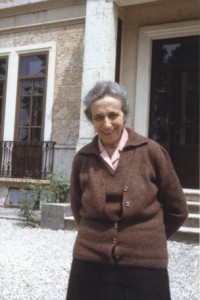 In preparation for the conclusion of the diocesan inquiry in Verona – which will take place on Monday 20 October 2014 – into the life, the virtues and the fame of holiness of Germana Sommaruga, we here offer you an opportunity to know about this extraordinary figure: a woman of hope, a tough intellectual, and a consecrated religious woman at the service of the sick.
In preparation for the conclusion of the diocesan inquiry in Verona – which will take place on Monday 20 October 2014 – into the life, the virtues and the fame of holiness of Germana Sommaruga, we here offer you an opportunity to know about this extraordinary figure: a woman of hope, a tough intellectual, and a consecrated religious woman at the service of the sick.
GERMANA SOMMARUGA:
THE PROPHECY OF AN ‘ORDINARY WOMAN’
Germana Sommaruga was certainly not an ‘ordinary woman’ and this because of her intelligence, her learning and in a very special way because of her sensitivity and the spiritual gifts with which God had enriched her. One can affirm that nature and Grace in her were expressed in a notable way despite and beyond her weaknesses, limits, trials, reserved character…
And yet she defined herself, she felt and she lived as an ‘ordinary woman’, not out of a foolish humility but because her point of reference, her point of comparison, were not other creatures but the Man Jesus, the only true man, the source of Hope. And on this Hope Germana truly based every choice of her life, with the passion of a woman who loved, with the suffering of inadequacy, and with the patience of one who knew the trials of believing.
Perhaps only with this approach can one read the contradictions of her personality. Aristocratic by birth and in behaviour, she had a very lively intelligence and was open to everything. Always poised, shy and reserved, a ‘bear’, as she said, she opened up to anyone with sweetness, intuition of the heart and real attention, as a result of which the other person felt that he or was her only interest: she reached everyone with a written note that broke loneliness, words that encouraged, and looks that welcomed. He pushed everyone to go ‘beyond’, she suggested and supported new ideas, openings, enthusiasms, and at the same time understood weaknesses and poverty.
Tormented by doubts of faith, by questions about pain, by her suffering at the evil and injustice that the complexity of the human spirit provokes, but also by faithlessness or lack of farsightedness of someone who lives in a mediocre way after giving their life for the service of the Church.
Germana wrote: ‘Suffering can have a meaning only if we ask questions of faith, even if the deepest mystery remains; indeed Christ gave meaning to pain which in him and with him can be transformed into offering, but the mystery of his redemptive passion remains, to which every human suffering is associated to become co-redemption. So suffering has a meaning if we learn to turn our gaze beyond and above, if, that is to say, we have present the paschal mystery of Christ – from the passion to the resurrection’.
Her answer was to place herself in silence and love in front of the infinite Love, commending the whole of her journey and that of the world to the hands of the Father, with the trust and the abandonment that does not eliminate worry but gives it the meaning of the human limits to understanding.
She wrote in a poem: ‘I am like a leaf, Lord, a leaf I am, dry, which your nocturnal dew adorns with pearls at dawn. A leaf that has fallen from your living branch in the furrow of the removed earth to become, in it, earth. And you adorn it with pearls with the first sun!’.
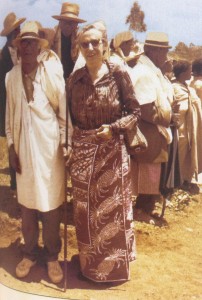 St. Camillus was a great presence in her life. A model? No, a ‘brother’, a friend with whom to feel in harmony, despite the centuries that separated them: she always felt joy at having been born on the same day, 25 May (she in 1994, he in 1550), and she wrote about him constantly, on more than one occasion, with different languages and various kinds of exploration, so that everyone could understand at their own level the messages that Camillus had communicated more through his life than through his words. Amongst other things, she edited the modern transcription of the letters that Camillus wrote to his religious. Only her sensitivity could grasp the similarity between herself and that ‘rough bad soldier’ who, however, said that one had ‘to be at the side of the sick with the same affection that a tender mother has for her sick only child’.
St. Camillus was a great presence in her life. A model? No, a ‘brother’, a friend with whom to feel in harmony, despite the centuries that separated them: she always felt joy at having been born on the same day, 25 May (she in 1994, he in 1550), and she wrote about him constantly, on more than one occasion, with different languages and various kinds of exploration, so that everyone could understand at their own level the messages that Camillus had communicated more through his life than through his words. Amongst other things, she edited the modern transcription of the letters that Camillus wrote to his religious. Only her sensitivity could grasp the similarity between herself and that ‘rough bad soldier’ who, however, said that one had ‘to be at the side of the sick with the same affection that a tender mother has for her sick only child’.
She seemed and lived as an ‘ordinary woman’, in a house on the outskirts, by her work as a teacher in a secondary school: she loved the school, the pupils, her work colleagues…in her teaching she was creative and impassioned. She believed in her work which she never wanted to leave despite her many commitments, as a means of support to live gospel poverty as well, to share and be with others, with the joys and the burdens of her work. She lived her ‘prophetic’ approach with deeds, words and initiatives which in their simplicity could appear normal but which had inside them the ‘creative’ power of love that tries to offer a response to problems that are encountered, well aware that in some cases it would only be a drop but also aware that she could not pass by those who suffered without ‘bending down’ in front of them, aware that a drops make up an ocean if everyone makes their own small contribution.
Germana wrote: ‘One can deal with human suffering in many ways: first of all prayer that embraces those who are near by and those who are far away, which reaches everyone. There is the humble offering up of one’s own work, of one’s own tribulations and joys, the petition of comfort, forgiveness, serenity and hope for those who suffer. There is the giving of one’s own time, one’s own talents of the mind and of the hands, through the fourteen works of mercy, both corporeal and spiritual: deeds of fraternal love, the gift of light, of hope, which can fill a life. Perhaps many lives would be less empty if they were filled with our attention, listening, smiles, words…’.
But how could this prophecy be made practical?
Endowed with accomplishments of the pen and speech, rich in knowledge and thought, in addition to her spirituality she gave with full hands her riches for the formation of nursing staff so that they could be at the side of the sick with dedication and love, through broadcasts on Radio Vatican, and through reviews on spirituality providing her thoughts on the subjects of pastoral care, the world of missionary activity, of drawing near to the suffering, of secularity and of consecration. She clarified and developed the spirituality of hope as a root of the charism of secular the Institute that she founded, but she also became its animator in all circumstances and with every instrument. Hope as Christ, the only source of peace and of hope, but also hope in man who carries within him the seeds of the Son of God, and even when he does not know him or does not accept him he hopes in something, in someone…
At the age of twenty-one she thought that she would live following Christ in simplicity, in the spirituality of St. Camillus, beginning her novitiate with the ‘Daughters of St. Camillus’. But on 6 January 1936, only a few months after joining, she saw the ‘light’, what she would always call the ‘first idea’: to found a group of lay women who, remaining in the world, in everyday life, in the most varied jobs and contexts, would give their lives to Christ for a total readiness to help the suffering, everywhere and at any cost. German described her ‘first idea’ in the following way: ‘the evening of 6 January 1936 behold Our Lord deigned to show me his will: to begin a group of consecrated people in the world to carry out the apostolate of charity amongst sick people who were the furthest from God, according to the spirit of our saint Camillus. The Idea was clear, but how could it be implemented?
It was a prophecy: secular Institutes had still not been created by the Church which only in 1947, meeting the requests of various members of the lay faithful (such as Lazzati and Barelli), recognised and founded the vocation of secular consecration. A Camillian, Father Angelo Carazzo, perceived the extraordinary vocation of this young woman and believed in her, supporting her on her journey, without taking the place of the action of Grace. Not everyone immediately understood the prophecy of her insight, but Germana received encouragement and advice from many people. In 1946 Germana went to Pius XII who received her with great interest; she was always supported by the deep and paternal friendship of Cardinal Larraona. In 1948 the ‘Women Missionaries of the Sick’ was recognised as a secular Institute, and to its name was subsequently added the specifying words ‘Christ the Hope’. This was a truly lay Institute which now has about 350 members spread throughout the world.
Each member lives her reality of being a consecrated lay woman in mission for the suffering in the way that is most consonant with her personal reality and requested by social reality. In other countries, as well, the ‘missionary’ task of the Institute, as Germana said, lies in forming people who in their countries are given to Christ in ‘mission’.
A subject that was especially important to Germana was the role of lay people in society and the Church. She fought with ideas, with the constancy, steadiness and sweetness that were typical of her character, to ensure that lay people became aware of their task within the Church and were present in an active way in society. After the Second Vatican Council she was a lively, positive, loved and esteemed presence in the Holy See, as a consultor for the Secular Institutes as well.
But above all else she lived her daily life as a lay woman in a simple way, a life made up of faithfulness to her duty: competence and serious training in her work as a teacher, participation in the life of the school, the context, the parish…She wrote: ‘The world is the privileged environment in which Christians are called to live and be fulfilled: the world in which we are born and in which we grow up, remaining within temporal realities which should be ordered according to God, directed according to Him. The world is the place where a lay person fully exercises his or her life which becomes apostolate: a life for Christ and for men, animated by the Spirit, lived in its earthly and profane aspects, excluding sin. A life that takes on and sanctifies in Christ the values and the tensions of its time, the trials, the joys and the aspirations of men, in order to look together – in Christ – for the basic answer to problems’.
To remember German means to remember in her the billions of ‘ordinary’ people who ‘hold up’ the world, knowing, however, that for her sociological reality took on a ‘theological’ meaning because she lived it in Christ, incarnated and lived by man to express the totality of the love of the Father. Germana was always ahead of her times, with the insight of love. She said that nobody should feel ‘special’: we are simple creatures, but we can look at the problems of other people with our hearts and our intelligence, be attentive, interested, knowing so as to offer help and competence.
And she knew with the same simplicity how to withdraw when her suffering became too strong and her age impeded her from looking after herself: as an ‘ordinary woman’ she entered a nursing home of the Camillian religious in Capriate where she spent the last years of her life, continuing to give her human energy, her experience and her love to Camillus.
Text from the site: http://www.aigermana.it



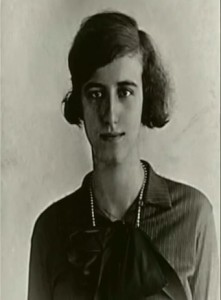





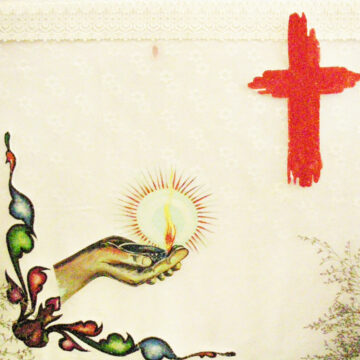
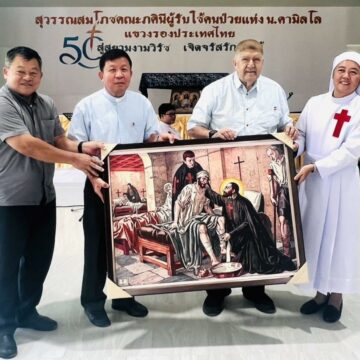
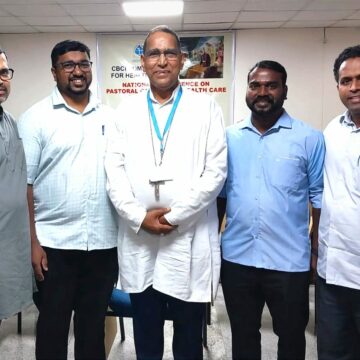


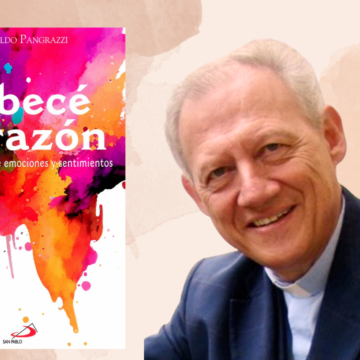
Camillians on Facebook
Camillians on Twitter
Camillians on Instagram